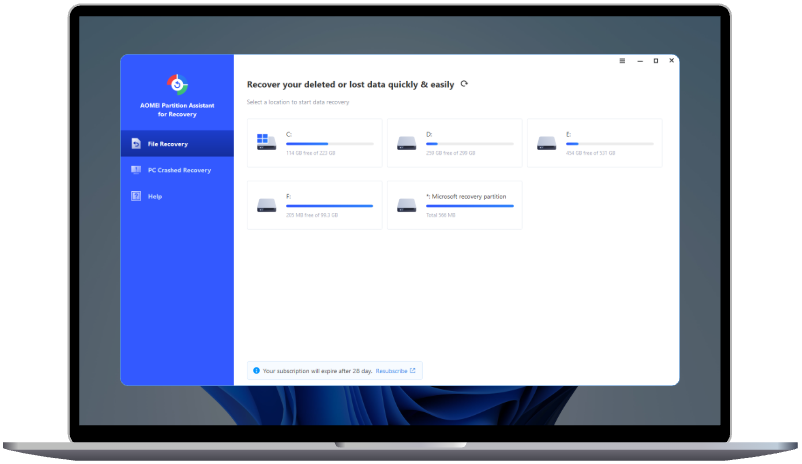How to Fix USB Storage Device Not Connected PS4 [7 Ways]
Is your USB storage device not connected PS4? Don’t worry, this post will guide you to solve this annoying problem in seven ways. In addition, it offers a data recovery tool in case of any data loss.
Why my USB storage device is not connected to PS4?
It can be very annoying to receive the message "USB storage device is not connected" on your PlayStation 4 (PS4).
USB storage devices are essential for expanding the PS4's storage capacity, storing game data, updates, and other files. When this error pops up, it not only disrupts your gaming experience but can also lead to potential data loss.
This guide offers step-by-step solutions to resolve the "USB Storage Device Not Connected on PS4" error and introduces USB recovery software to help you recover lost data.
Before we get into the answers, let's take a look at some common causes of this problem:
➳ Broken USB storage device, port, or cable: If your USB drive, port, or cable is damaged, your PS4 may fail to connect.
➳ Electrical shortage: Dropping your USB storage device, especially when connected to your PS4, can cause an electrical short or power surge, leading to the PS4 not recognizing the USB drive and displaying the CE-37857-0 error.
➳ Incompatible file system: The PS4 recognizes USB drives formatted with the exFAT or FAT32 file systems. If your drive is formatted with NTFS, the PS4 will not detect it.
➳ Outdated or improperly installed PS4 system software: Sony regularly releases system software updates to enhance the PS4's performance and fix bugs. If your software is outdated or was improperly installed (e.g., interrupted during the update), it may affect the PS4’s ability to connect to USB devices.
➳ Incompatible USB drive: An outdated PS4 system can also cause compatibility issues with certain USB devices.
How to fix the PS4 USB storage device not connected issue
This part concludes with seven easy and useful methods to help you fix PS4 not recognizing USB issue. The detailed steps are as follows:
Fix 1. Check the USB connection
If you encounter the message "The PS4 USB storage device is not connected CE-30784-2/CE-37857-0", it means the PS4 system is unable to detect or recognize the connected USB storage device.
To troubleshoot this issue:
1. Make sure the USB cable is securely connected to the PS4.
2. Try plugging the USB device into a different port on the PS4 to see if that resolves the issue.
3. Verify that the USB device is compatible with USB 2.0 or 3.0.
4. Ensure the device has only one partition.
If possible, connect a different USB device to the PS4 to check if it works properly. This can help determine if the issue is with the USB port on the PS4 or the original USB storage device. If the new device also fails, the problem may lie with the PS4’s USB port.
Fix 2. Restart your PS4
Whether caused by an electrical issue or another problem, you can often resolve the "USB storage device not connected" error on your PS4 by simply restarting the system. Follow these steps:
Step 1. Click on the Power icon located in the bottom right corner.
Step 2. Go to Power Options and select Restart PS4.
Fix 3. Install/Reinstall PS4 system software update
It's important to keep your PS4’s system software up to date to ensure compatibility with USB storage devices.
If you encounter the error code “PS4 USB storage device not connected SU-41333-4,” it indicates a problem with the update process.
This issue isn't exclusive to the PS4; similar problems can occur with Windows updates. If you experience difficulties updating Windows, try resetting the Windows Update component to resolve the issue.
Step 1. Power off & disconnect the console > turn off the modem > turn it on after 5 mins > connect the console > restart.
Step 2. Notifications > find the malfunctioned update file > Options > Delete.
Step 3. Settings > select System Software Update > choose Update Now.
Once the update is successfully installed, your PS4 should function properly, and the "PS4 USB storage device not connected SU-41333-4" error should be resolved.
Fix 4. Format/Reformat USB drive to FAT32 or exFAT
If your USB drive is formatted with the NTFS file system, it won’t be recognized by the PS4, as the console only supports FAT32 and exFAT file systems.
Additionally, if the file system on your USB drive is corrupted, the PS4 may not be able to recognize it. Reformatting the drive can resolve this issue, but keep in mind that doing so will erase all data on the drive, so make sure to back up your files before proceeding.
Step 1. Connect the USB drive to your PC > right-click on the Start menu > select Disk Management.
Step 2. Find the USB drive > Format > choose the exFAT/FAT32 file system > OK.
-
You may want to know: How to recover files from the formatted hard drive.
Fix 5. Initialize your PS4
If reformatting doesn’t work, you may need to initialize your PS4. This process restores the console to its factory settings, so it’s crucial to back up your game saves and other important data first.
To initialize your PS4, follow these steps:
Step 1. Press and hold the power off button > release and wait for two beeps to enter safe mode.
Step 2. Connect the DualShock®4 controller using a USB cable and press the PS button.
Step 3. Select Initialize PS4 (Reinstall System Software) > wait for the process to complete.
After initializing, update your PS4 to the latest system software version. Then, reconnect your external USB drive to the PS4 and check if the extended storage functionality is working properly.
Fix 6. Clear CMOS Memory
Every PlayStation console is equipped with a CMOS (Complementary Metal Oxide Semiconductor) battery, which stores the system's date and time information, keeps the real-time clock running, and saves BIOS settings.
However, issues with the CMOS battery can sometimes trigger the "USB storage device not connected" error on your PS4. While replacing the battery isn’t always necessary, disconnecting and reconnecting it can clear the CMOS memory, though this will reset BIOS settings to their factory defaults.
Given the complexity of this process, it's advisable to leave the removal and reconnection of the CMOS battery to professionals. The battery is located on the console’s motherboard, so disassembling and reassembling your PS4 is required, which involves technical expertise.
Fix 7. Ask PlayStation official for help
If none of the previous solutions have worked, it's best to reach out to PlayStation Support for further assistance. They can offer specialized guidance to help resolve the issue.
You can visit their Support site or contact PlayStation Network Support at 800-345-7669, available Monday through Friday. If you prefer messaging, PlayStation's live chat option is available on weekdays from 6:00 am to 10:00 pm and on weekends from 7:00 am to 8:00 pm.
How to recover data from PS4 not recognized USB flash drive?
The above solutions should help you resolve the "PS4 USB storage device is not connected" error. However, if you experience data loss during the process, there's still hope. You can recover your files from corrupted, damaged, or inaccessible USB devices using professional data recovery software called AOMEI Partition Assistant for Recovery. This tool stands out for its brilliant advantages:
★ Ease of use: Recover lost or deleted data from external or internal HDDs, SSDs, USB drives, SD cards, and more in just three simple steps.
★ Convenience: Supports sorting and previewing by type, date modified, size, and more, with direct file recovery options.
★ Wide applicability: AOMEI Partition Assistant for Recovery is effective in numerous data loss scenarios, including accidental deletion, formatting, emptying the recycle bin, virus attacks, and system crashes.
★ Efficiency: Recover essential data such as images, videos, documents, and compressed files quickly and efficiently.
★ Compatibility: AOMEI Partition Assistant for Recovery supports NTFS, FAT32, exFAT, and ReFS file systems, and works with Windows 11, 10, 8, 7, and Server.
With AOMEI Partition Assistant for Recovery, you can effortlessly recover lost files from various storage devices, including USB drives that the PS4 fails to connect with:
Step 1. Install and launch AOMEI Partition Assistant for Recovery. Choose the exact partition or disk where your data is lost and click Scan. If you don't know which drive keep the data before, you can check them one by one.
Step 2. Then, the recovery tool start to scan and search. lt will execute the “Quickly Scan" first for finding your deleted data fast, and then execute the “Deep Scan" for searching other lost data.
Step 3. Once the scan is completed, all deleted files, recycle bins and other missing files will be displayed. Please select the file you would like to recover and then click "Recover".
Step 4. Then, select a folder path to save your recovered files.
Step 5. Wait patiently for this process of recovering ends.
Conclusion
Dealing with the "USB storage device not connected PS4" error, along with error codes like SU-41333-4, CE-30784-2, and CE-37857-0, can be quite frustrating. However, by following the troubleshooting steps outlined in this article, you can resolve the issue and get back to enjoying your games. If you experience data loss during the troubleshooting process, AOMEI Partition Assistant for Recovery can efficiently help you recover all lost data, offering a reliable solution for users.

